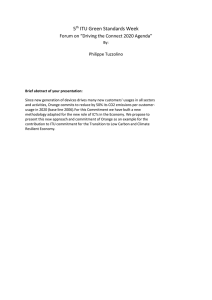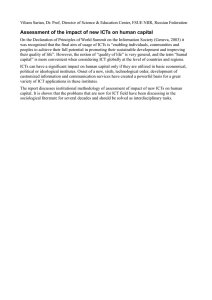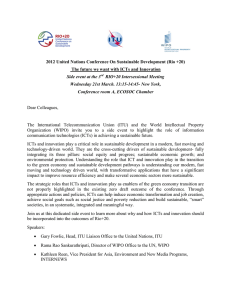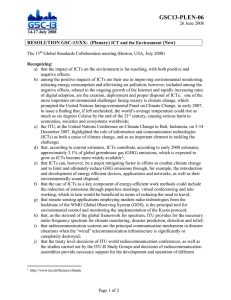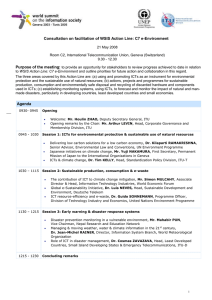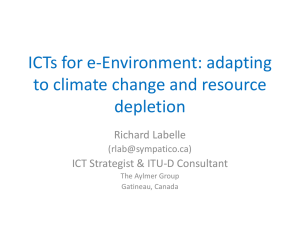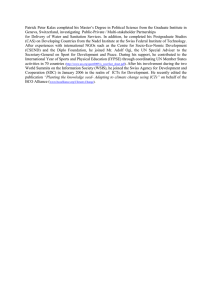WTPF-IEG/3/DO-3 The fourth World Telecommunication Policy Forum (Lisbon, 2009),
advertisement
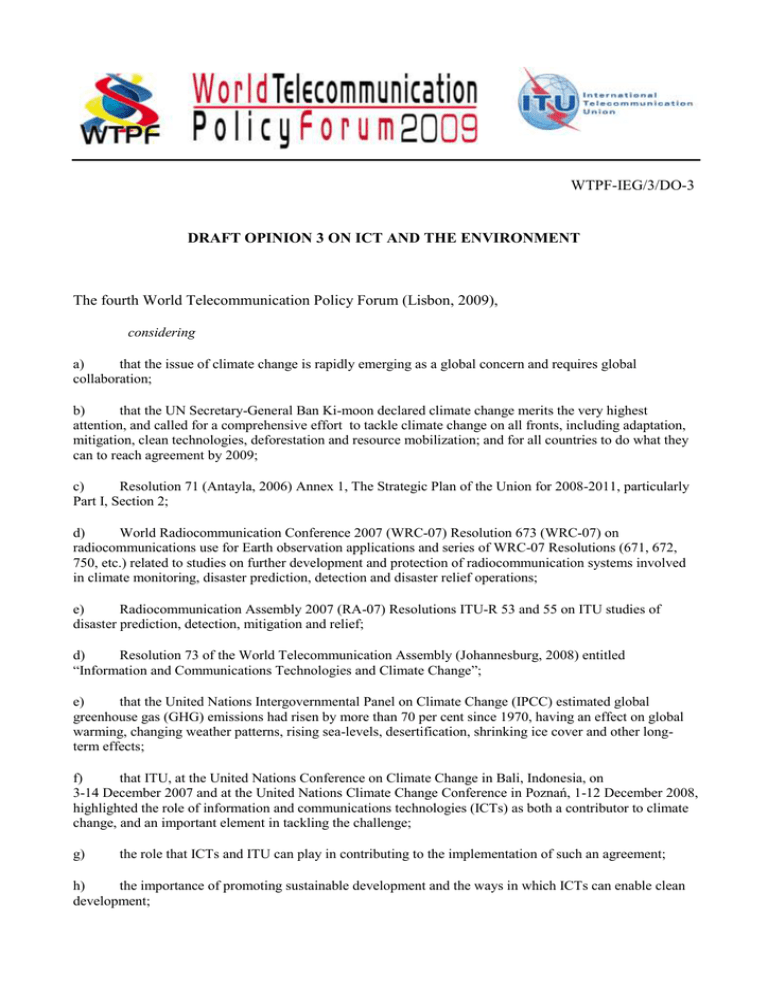
WTPF-IEG/3/DO-3 DRAFT OPINION 3 ON ICT AND THE ENVIRONMENT The fourth World Telecommunication Policy Forum (Lisbon, 2009), considering a) that the issue of climate change is rapidly emerging as a global concern and requires global collaboration; b) that the UN Secretary-General Ban Ki-moon declared climate change merits the very highest attention, and called for a comprehensive effort to tackle climate change on all fronts, including adaptation, mitigation, clean technologies, deforestation and resource mobilization; and for all countries to do what they can to reach agreement by 2009; c) Resolution 71 (Antayla, 2006) Annex 1, The Strategic Plan of the Union for 2008-2011, particularly Part I, Section 2; d) World Radiocommunication Conference 2007 (WRC-07) Resolution 673 (WRC-07) on radiocommunications use for Earth observation applications and series of WRC-07 Resolutions (671, 672, 750, etc.) related to studies on further development and protection of radiocommunication systems involved in climate monitoring, disaster prediction, detection and disaster relief operations; e) Radiocommunication Assembly 2007 (RA-07) Resolutions ITU-R 53 and 55 on ITU studies of disaster prediction, detection, mitigation and relief; d) Resolution 73 of the World Telecommunication Assembly (Johannesburg, 2008) entitled “Information and Communications Technologies and Climate Change”; e) that the United Nations Intergovernmental Panel on Climate Change (IPCC) estimated global greenhouse gas (GHG) emissions had risen by more than 70 per cent since 1970, having an effect on global warming, changing weather patterns, rising sea-levels, desertification, shrinking ice cover and other longterm effects; f) that ITU, at the United Nations Conference on Climate Change in Bali, Indonesia, on 3-14 December 2007 and at the United Nations Climate Change Conference in Poznań, 1-12 December 2008, highlighted the role of information and communications technologies (ICTs) as both a contributor to climate change, and an important element in tackling the challenge; g) the role that ICTs and ITU can play in contributing to the implementation of such an agreement; h) the importance of promoting sustainable development and the ways in which ICTs can enable clean development; i) the possible contribution of ICTs to finding a solution to the global problem of distribution of food, which includes using ICTs for sustainable and environmentally-friendly agriculture; j) that the role of ICTs to tackle the challenge of climate change encompasses a wide-array of activity, including, but not limited to, the development of energy-efficient devices, applications and networks; the development of energy-efficient working methods; the implementation of satellite and ground-based remote sensing platforms for environmental observation, including weather monitoring; and the use of ICTs to warn the public of dangerous weather events and provide communications support for government, military and NGO aid providers; k) that Government, civil society and the private sector are encouraged to initiate actions and implement projects and programmes for sustainable production and consumption and the environmentally safe disposal and recycling of discarded hardware and components used in ICTs. considering further a) the ITU Report on Climate Change, which provides a comprehensive background of the ITU activities related to climate change; b) the High-Level Segment at Council 2008, which highlighted the potential of ICTs to combat climate change; c) that ITU Recommendations can play a critical role in the development of ICTs, such as the Common Alerting Protocol (CAP), Recommendation (ITU-T X.1303) which specifies a standard format for the distribution of emergency alerts and provides for interoperability of ICTs involved in the detection and dissemination of disaster alerts; d) the leadership of ITU-R in establishing a cooperative arrangement with the World Meteorological Organization (WMO) in the field of remote-sensing applications, and the ITU membership in identifying the necessary radio-frequency spectrum requirements for climate monitoring and disaster prediction, detection and relief; e) the report entitled, "Strategy for a climate-neutral United Nations", prepared by the Environment Management Group, and the endorsement by the Chief Executives Board (CEB) in October 2007 of the strategy committing the United Nations system to attain climate neutrality within three years; f) the objectives, specific tasks, and deliverables of the ITU-T Focus Group on ICT and Climate Change which was established by the Telecommunication Standardization Advisory Group (TSAG), and which met three times, and completed its work in March; g) the standards development activities on ICTs and climate change by, for example, relevant ITU-T study groups in work related to ubiquitous sensor networks (USN), which allow the detection, storage, processing and integration of situational and environmental information gathered from sensor devices connected to telecommunication networks; i) the outcomes of the ITU Symposia on "ICTs and Climate Change", held in Kyoto, Japan, on 15-16 April 2008, and in London, United Kingdom, on 17-18 June 2008; k) the ITU’s role in launching the Dynamic Coalition on Internet and Climate Change (DCICC), which held its first meeting on 4 December 2008 during the Internet Governance Forum in Hyderabad and seeks to moderate the environmental impact of the Internet and to find new ways to embrace the power of the Internet for reducing greenhouse gas (GHG) emissions worldwide; l) the ITU’s organization of a workshop at the IGF on the “Internet and Climate Change”, which featured a number of prominent speakers who emphasized that ICTs can potentially play an important role to reduce these emissions across all sectors, recognizing [broad implications] a) that ICTs can make a substantial contribution to mitigating and adapting to the effects of climate change; b) that ICTs play a vital role in monitoring and addressing climate change by supporting basic scientific research, which has helped to bring the issue of climate change into the public domain and to raise awareness of future challenges; c) that a future high-bandwidth, lower-carbon information society offers a platform for economic, social and cultural development that is sustainable; d) that the adverse effects of climate change may be uneven in their impact and may fall disproportionately on the most vulnerable countries, mainly the developing countries1, given their limited capacity to adapt; e) that ICTs can, however, be a major mitigating factor in efforts to moderate climate change and to limit and ultimately reduce GHG emissions through, for example, the development and introduction of energy-efficient devices, applications and networks; f) that the use of ICTs as a key component of energy-efficient work methods could include the reduction of emissions through, for example, paperless meetings, virtual conferencing, teleworking, etc, which in turn would be beneficial in terms of reducing the need to travel, noting [implications for regulators] a) that ICT solutions to the problem of climate change may be implemented by Member States and by ITU Sector Members, and that collaboration between Member States and Sector Members, and other stakeholders may be necessary to address the problem; b) that voluntary energy efficiency ICT equipment standards may be adopted while recognizing the benefits and challenges posed by increased use of ICTs and consequent energy consumption; c) that collaboration between Member States and Sector Members will be necessary to effectively address the issues of climate change and the global problem of distribution of food; d) that it is essential and urgent to provide an enabling environment in which Member States, Sector Members, and other stakeholders, may cooperate to bring the benefits of ICT applications to the area of disaster prediction, detection and relief; e) that it is important to provide an enabling environment in which Member States, Sector Member, and other stakeholders may cooperate to obtain and effectively use remote sensing data for research and public administration purposes,2 1 These include the least developed countries, small island developing states and countries with economies in transition. 2 Which includes areas such as water management, air quality, agriculture, fishing, health, energy, environment, ecosystems and pollution control. [realizing/conscious] [implications for government policies and regulation] a) that each Member State has the sovereign right to develop policies related to reducing carbon dioxide emissions to meet its needs and objectives; b) that Member States pursue policies that encourage market-driven innovation and investment to reduce green house gas emissions; c) that Member States have legitimate public policy goals to motivate the energy and other industries to develop effective methods to help address climate change challenges; d) that people can benefit from Member State efforts to increase awareness and promote information sharing on the role of ICTs in combating climate change, in particular by promoting the use of more environmentally-beneficial and energy-efficient devices and networks and more efficient working methods, as well as ICTs that can be used to replace or displace higher energy consuming technologies/uses, Invites all Member States and Sector Members to: i) support the development of energy-efficient products, such as “smarter” products that control their own energy outputs, and conserve energy when not in use; ii) to continue to contribute to the creation of ITU standards for digital compression, which enable online delivery of books, music, video and other multi-media content and reduce pollution; iii) to encourage the use of ICTs for telecommuting, which can potentially lessen pollution outputs and help consumers conserve energy; iv) to encourage use of ICTs to bolster international efforts to find solutions to the problem of distribution of food, through, for example, the use of radio-frequency identification (RFID) to manage food inventories and monitor shipments to ensure efficient logistics, and the use of sensor networks to monitor farming machinery and irrigation systems; v) to consider enhanced use of remote sensing (active and passive) for environmental observation , which can be used to forecast weather and warn the public in the case of natural disasters and to gather information on dynamic environmental processes and systems; vi) to consider the enhanced use of ICTs to respond in the event of a natural or man-made disaster, which may include broadcast sound and television systems, and various satellite and mobile radiocommunication systems; vii) to consider the development and the promotion of the use of innovative cooling systems for data centres which lessen energy consumption; viii) to continue to contribute to the ITU efforts related to this Opinion, Invites further The Secretary-General a) to continue, within the mandate of the ITU, to cooperate and collaborate with other entities within the UN in formulating future international efforts for the effective addressing of climate change, and to report the results of these efforts to the Council, The Directors of the Telecommunications Standardization Bureau, the Radiocommunications Bureau and the Telecommunications Development Bureau b) to continue to work together, and with relevant study groups, to raise the awareness of these issues, especially in developing countries, as work progresses in their respective Sectors; c) to promote liaison with other relevant organizations in order to avoid duplication of work and to optimize the use of resources.
